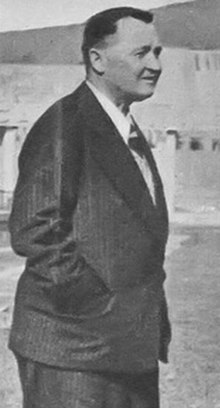The Play's the Thing (play)
| Ferenc Molnár | |
|---|---|

Ferenc Molnár (photo by Carl Van Vechten, 1941)
|
|
| Born | Ferenc Neumann 12 January 1878 Budapest, Austria-Hungary (present-day Budapest, Hungary) |
| Died | 1 April 1952 (aged 74) New York City, New York, U.S. |
| Resting place | Linden Hill Methodist Cemetery, Ridgewood, Queens |
| Occupation | Novelist |
| Years active | 1908-1952 |
| Spouse | Margit Vészi (1906-1910; divorced; 1 child) Sári Fedák (1922–1925; divorced) Lili Darvas (1926-1952; his death) |
| Children | Marta Molnar Sarkozi (1907-1966) suicide |
Ferenc Molnár (birthname Ferenc Neumann; 12 January 1878 – 1 April 1952) was a Hungarian-born dramatist and novelist who adopted American citizenship. Molnár was born in Budapest. He emigrated to the United States to escape persecution of Hungarian Jews during World War II.
As a novelist, Molnár may best be remembered for The Paul Street Boys, the story of two rival gangs of youths in Budapest. It was ranked second in a poll of favorite books as part of the Hungarian version of Big Read in 2005 and has been made into feature films on several different occasions. His most popular plays are Liliom (1909, tr. 1921), later adapted into a musical (Carousel); The Guardsman (1910, tr. 1924), which served as the basis of the film of the same name, which starred Alfred Lunt and Lynn Fontanne (1931); and The Swan (1920, tr. 1922). His 1918 film, The Devil, was adapted three years later for American audiences, starring George Arliss in his first nationally released film. The 1956 film version of The Swan (which had been filmed twice before) was Grace Kelly's penultimate film, and was released on the day of her wedding to Prince Rainier.
Molnár's play The Good Fairy was adapted by Preston Sturges and filmed in 1935 with Margaret Sullavan, and subsequently turned into the 1947 Deanna Durbin vehicle, I'll Be Yours. (It also served as the basis for the 1951 Broadway musical Make a Wish, with book by Sturges.) The film version of the operetta The Chocolate Soldier used the plot of Molnár's The Guardsman rather than the plot of its original stage version, which was based on George Bernard Shaw's Arms and the Man, because Shaw reportedly disliked the operetta adaptation of his work, and would not allow his plot to be used for the screenplay.
...
Wikipedia
